On the Lost Highway with Greil Marcus
04.10.07
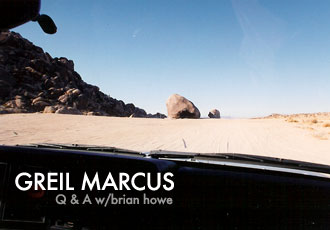 Greil Marcus Q & A
Greil Marcus Q & A
Conducted in the Manuscripts Dept.
of UNC’s Wilson Library
by Brian Howe
September 14, 2007
Music journalists who’ve been in the business for as little as a decade have seen the emphasis shift from insight to summarization, from text to image, in compliance with our culture’s ever-accelerating addiction to velocity. Word counts keep shrinking as advertisements and photos grow larger. In many mainstream print formats, writers are barely afforded enough space to substantiate their star ratings, which, like blurb-sized reviews and their accompanying images, can only boil down complex things into simple things. This is the enemy of good criticism, which enlarges and enhances works of art. Because of this forced crystallization, modern pop-criticism as a whole reads more like an investigation of capricious taste than of the value, meaning, and historical continuity of art. The disconnect between what a work can mean and what we can publicly say about it grows ever wider.
As the first reviews editor for Rolling Stone in the late-60’s, and as a writer for influential publications like CREEM, the Village Voice, and Artforum, Greil Marcus is among the architects of popular criticism as we know it, yet his voice is one that seems alien in the current landscape: Marcus takes nothing for granted. In his books Mystery Train and Lipstick Traces: A Secret History of the 20th Century, he expanded the purview of rock criticism beyond the usual blues musicians and 60’s countercultural affinities, casting a voluminous net across the history of Western civilization to make a case for rock music as a cultural “revolution” in the most literal sense of the word: an idea or spiritual posture that revolves in and out of popular consciousness, coming and going at great orbital intervals, dressed in the finery of a particular era but always fundamentally the same. Marcus shows us the culture as it is: densely swarming, intricately connected across time, and ultimately unfathomable at the microcosmic level. Only the macrocosm can illuminate the truth of an individual work.
Marcus’s latest book, The Shape of Things to Come: Prophecy and the American Voice, is another teeming macrocosm that illuminates, example by example, a sweeping reading of the nature of American identity. Marcus lays out his thesis in the earliest pages: the United States is a nation founded on promises so extravagant, so self-contradicting, that their betrayal was inevitable, and that the prophetic voice in America is the one that reminds us of this contract we made with ourselves (via a Puritanical God), calling us to self-judgment and warning of the grave consequences of the contract’s violation. Marcus spends the book tracing this voice’s trajectory through the culture, locating it first in the Old Testament prophets, then in political orations by Lincoln, King, and others, and finally, in the novels of Philip Roth, the films of David Lynch, the music of Pere Ubu, and a dazzling array of outlying points. The same inevitability that girds Marcus’s thesis is manifest in the book, each carefully elucidated example bolstering the implacable force of his argument.
Marcus came to the University of North Carolina with the band the Handsome Family to give a talk on murder ballads, but FANZINE caught up with him to talk about the book and the ideas that inform it. It’s difficult to imagine a better setting for interviewing the polymathic cultural critic than Wilson Library’s Manuscripts Department, amid stacks containing the sort of piecemeal cultural record that he enacts in his work. Marcus is the same in conversation as he is on the page: eloquent, intellectually audacious, and wildly discursive, extemporaneously refining his points via a maze of serial commas. Because the sections of The Shape of Things to Come that deal with film are among its most powerful – Marcus revels in sensory details, and his film analyses are as visually pleasurable as they are insightful – we wound up talking about directors that appear in the book, like David Lynch, as well as directors who don’t, like Michael Haneke and Lars Von Trier. I also had the chance to pick his brain about book tours, the concept of authenticity, and the responsibilities of the critic. That almost every question I asked managed to circle back to the book’s central idea speaks to its amplitude, as if no grain of American thought can escape its ambit.
––Brian Howe
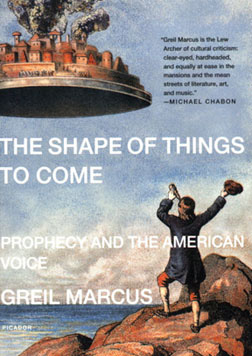 Q: Many authors don’t seem to enjoy book tours. For example, I just read in Harper’s––it’s too bizarre to be true, but here it is––that Margaret Atwood invented an autograph signing robot to send out on book tours. I wonder if, as a writer whose subject is the breadth of American culture, you find more enjoyment or creative fertility in book tours?
Q: Many authors don’t seem to enjoy book tours. For example, I just read in Harper’s––it’s too bizarre to be true, but here it is––that Margaret Atwood invented an autograph signing robot to send out on book tours. I wonder if, as a writer whose subject is the breadth of American culture, you find more enjoyment or creative fertility in book tours?
A: Well, I don’t believe that story for a minute. I wouldn’t go to see the Margaret Atwood robot myself. Book tours are very wearing, that’s why authors don’t like them. You have to get up early and go to bed late, you often eat lousy food or drink too much. You’re constantly traveling, you miss connections. But mainly, you have to be on all the time, you have to be funny or smart or have answers to questions. You may end up doing a lot of 6 a.m. local TV shows. It’s hard work. The other thing is that even if you’re a celebrity author, which I’m certainly not, you never know what’s going to happen. I remember Luc Sante once called me from somewhere in Iowa and said, “Can you explain to me why my publisher is spending money to send me to a book store in Iowa to read to three people?” One day, I walked down the street from my house in Berkeley, and there was a dumpy little bookstore, and there was an author sitting in the front window with a table in front of him and a big pile of books. He looked really unhappy, because nobody was there to see him or get an autograph. He looked familiar, and I realized it was Robert Parker, someone who for twenty years has had every one of his books go instantly on the bestseller list. The most popular mystery writer in the country maybe, and nobody showed up for him. So there’s always that worry. And you may just do a bad job, you may have a big crowd and do a bad job and leave people dispirited.
Q: Why do you think publishers continue to fund book tours in the face of all this apathy and adversity?
A: I read recently that publishers were backing off from book tours because they don’t make economic sense. The purpose of a book tour, unless you’re a very famous author or someone with a real cult, who’s going to attract 500 people to the store, and you’re going to sell 500 copies of the book and sign 500 more, isn’t to do a reading and sign books. The publisher makes no money on that. It’s to go on tour and do newspaper interviews, television, radio, stuff like that, and get people talking about your book. The fact is that one appearance on Fresh Air or one of the late night talk shows, let alone the heaven of all book promotion, Oprah, will do more than a thousand book tours.
Q: Can you describe for our readers the themes and impetus behind your new book, The Shape of Things to Come: Prophecy and the American Voice?
A: I have been fascinated with the idea of prophecy as the bedrock of American rhetoric. It’s a theme that comes up again and again when people ask what it means to be American, whenever there’s an attempt to say that this country is something whole, not just a collection of different states and ethnic groups. It’s not Iraq, it’s not Yugoslavia, it really is a place. I have always known that the voices of the Old Testament prophets––Jeremiah, Isaiah, Amos, the prophets who said to the children of Israel, “You’ve betrayed your covenant with god and ruin is going to be your fate, and your cities are going to fall to dust, and it will be as if your pastures were seeded with salt, unless you change your ways…”––that voice accusing the people or a whole society of betraying its promise is central to our understanding of who we are. In the most desperate moments that theme comes up again, whether it’s with Lincoln or Martin Luther King Jr. or Allen Ginsberg in the middle of the Vietnam War. But it also seems to me that you can find people seeking this voice, trying to get their hands on it. How do you speak in this voice, how do you act out what it says? You find that all over, in novels, music, movies. When I taught the course that this book grew out of, one of the things I did was to use three different versions of Invasion of the Body Snatchers. I really thought that movie captured the theme. You saw an entire society being dissolved, and behind it there was a sense that there was a reason for this. Nobody knows what it is, but nobody’s totally surprised. And I also found that in the nineteenth-century, American politicians up through Lincoln spoke in this voice all the time: William Lloyd Garrison, the great abolitionist publisher, did, Frederick Douglass did, John Brown did, people who pursued this notion that America is a society that makes promises that are so great that betrayal is inevitable, and coming to terms with that betrayal, recognizing it, becomes the engine that causes us to fulfill those promises. Because America is a society where people made a covenant with themselves, not with god. In our time, you find this voice in art, in culture. You don’t hear this in a serious way from political figures today, even religious figures. That’s why the book has the frame of classical American speeches and the heart of it is David Lynch, Philip Roth, the band Pere Ubu, Allen Ginsberg.
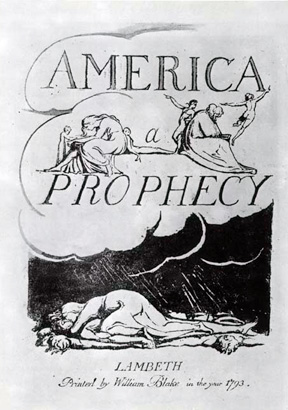 Q: So if we’ve seen this American capacity for self-judgment shift away from politicians, who have power, to artists, who are putatively marginalized, do you think this prophetic voice has a hope of affecting American reality at the level of politics and policy, not just the tone of its thought and self-image?
Q: So if we’ve seen this American capacity for self-judgment shift away from politicians, who have power, to artists, who are putatively marginalized, do you think this prophetic voice has a hope of affecting American reality at the level of politics and policy, not just the tone of its thought and self-image?
A: Nobody knows how cultural changes affect the way we think, what our desires are, what we’re afraid of, how we make choices whether private or public. I’m not pursuing this to say that three Philip Roth novels will somehow force America to look at itself in a real mirror and come to grips with its failings and possibilities, I’m not saying that at all. But I do think we all carry around notions in our head that are very unformed of what we think this country is and what we want it to be, and everything affects that. But certainly there’s no direct effect. A writer writes a book because he or she is fascinated by a subject and wants to follow it where it leads. One of the chapters in this book is called “Bill Pullman’s Face,” and it really is about the notion that in one actor’s face, over the course of several roles, you can see an enactment of the country using itself up and becoming a nihilist kingdom where nothing matters, where nothing anybody says makes any sense, where the betrayal has left that desert of the Old Testament. The prophet in my conception is a voice of judgment, as you were saying. I wanted to see if I could write an entire long chapter about this: here’s Bill Pullman, he’s a movie actor, a lot of his roles are boring and you confuse him with other actors because his looks are generic. I was fascinated by the notion that in a few roles you could see him judging the country as finished, empty, nothing left. I wanted to see if, as a writer, I could convince a reader to follow me along on that story. The motive for writing a book isn’t necessarily to make the world better, it’s to follow the material where it leads.
Q: Both Lynch and Roth are very taken up with the nature of identity. For Lynch it’s always this flickering, mutable thing that he seems to argue doesn’t exist in any quantifiable way. For Roth, it’s a binary, one thing on the surface, the opposite thing concealed. How did these two takes on identity dovetail to inform your idea of a unified American identity handed down across time?
A: I think there is an American identity handed down across time, but it’s not a single thing. It’s complex. What America is all about is that it promises every individual freedom to define and discover, but when you pursue your freedom you also betray your community because you leave it behind. In acting out the fact that you don’t need it and won’t obey or respect it, you are denying the whole that has given you this freedom. That paradox, that tension, is where I think American identity exists, if we want to set up something binary. I think it would be too facile to say it’s at war with itself, but in America, freedom, which is our birthright, is always accompanied by doubt and guilt. Refusing to seize freedom and only living within the suffocation of everyone else’s expectations, that’s a betrayal too, of your birthright to find out who you really are and what you really want. I think that is unique to this country. Every real society has a different sense of values and what’s most important, and I don’t think you find specifically that tension anywhere else. I mean of course you find it, but not as an identifying, fundamental element that ultimately everybody who is an American or wants to become one comes to grips with. When people say that people come to America because they want a better life, that always translates into “make more money.” Of course, that’s true in so many cases, but that’s not all that’s true, that’s not the only reason people come here. One reason so many people have come to the United States from Mexico over the past twenty years is that Mexico, over the past century has been a vicious, authoritarian, corrupt gangster-state, where to speak out, to try to form a labor union, to in any way go past a whole series of unwritten laws, could mean you’d end up dead, or with your livelihood taken away. So the people who are crossing the border, yeah, they want a “better life,” they want to make more money, but they also want to send their kids to better schools and grow up in a place where they can become whatever they want to become. All those clichés are driving people here.
 Q: Another thing I found very striking about the chapters on film is that inasmuch as they’re about American identity, at a more basic level they seem to be about seeing, about perception. You really revel in the sensory details of these films, going to great lengths to make the reader perceive them before analyzing them. I wouldn’t imagine you write this way proscriptively, but do you believe that there are elements active in American culture predicated against deep perception?
Q: Another thing I found very striking about the chapters on film is that inasmuch as they’re about American identity, at a more basic level they seem to be about seeing, about perception. You really revel in the sensory details of these films, going to great lengths to make the reader perceive them before analyzing them. I wouldn’t imagine you write this way proscriptively, but do you believe that there are elements active in American culture predicated against deep perception?
A: No, I don’t think so. One of the great things about being a critic is getting to spend your time on things other people are too busy to attend to. So you get to watch a movie many times, or replay it in your head, or listen to a record for days on end, or read a book six times, until you are at home with it, and seeing through its eyes or speaking with its voice. Other people are busy doing other things. It’s not like I’m saying, “I see more deeply than you do,” I’ve just spent more time with it, just like you’ve spent more time doing what you do and could tell me things about that I could never grasp myself. My daughter said something that I incorporated into the book about Lost Highway, which is a movie she loves and has seen many times. About Mulholland Drive, which was so confusing to people, me included, the first time they saw it, she said the more you see it the more sense it makes, and the more times you see Lost Highway, the less sense it makes and the more unstable it becomes. That’s really frightening, something that continues to resist summation, my ability to say, “This is what happened.” In the book, I end up disagreeing with Barry Gifford, who wrote the damn thing.
Q: Have you had the chance to see Inland Empire, which came out after the book was written?
A: I saw it twice. I was really hoping that the second time it would come alive for me in a way that it didn’t the first time, but it didn’t. There were parts I loved watching, and I wish they’d gone on longer, like when Laura Dern goes up many flights to see what looks like a Hungarian private detective or something, this really sleazy looking character. I love those scenes, and the ones with the big rabbits. But ultimately I didn’t care enough to invest myself in the characters and the jeopardy they were in.
Q: There seems something distinctly American about the mix of paranoia and excitement you might experience when receiving video tapes of your life from a mysterious source, which happens to Bill Pullman’s character in Lost Highway. But we saw the same concept revived last year in a film by a German filmmaker, Michael Haneke’s Cache. As technological advancement continues to erase more traditional regional and historical boundaries, will a distinctly American identity be preserved?
A: Well, let me tell you two things about Cache. The first is that in Cache, a person is being sent these threatening videos in really the exact same manner as in Lost Highway, but there are specific reasons for it. It’s all rooted in particular events in the past, and in the end we really do find out who and why. It’s all explained, and in Lynch it is not. Lynch is working in the realm of the gothic tale, covering the same territory as Washington Irving in “The Legend of Sleepy Hollow,” Edgar Allen Poe, Hawthorne, and into Faulkner, that whole strain of the uncanny, the haunting, the dead rising to take their revenge, of this somehow all being a terrible mistake. It really is a great social drama. They’re saying, “This land is cursed, and it’s up to us to figure out how and why,” but the artist never offers any simple answer. With Haneke, it all fundamentally resolves itself. I met him at a film festival right after I saw that movie, and I said, “It’s just fascinating what you’ve done with the same premise David Lynch used in Lost Highway, and he looked at me and said, “What are you talking about? I’ve never seen that movie.” Sure. So they’re very different films. D. H. Lawrence would say that this country is different from any other country because it is cursed, and it’s cursed because there’s no step you can take on this continent where you’re not stepping on a grave, by which he means a dead Indian. Well, I don’t see it that way, but that’s what was compelling to him. He’s out there in New Mexico where there are Indians all around and the woman he’s staying with is having an affair with one, so he’s very conflicted about it. I think from the very beginning when people came here and said, “We’ve come to this land to establish a new world,” this was a terrible mistake. Look at what we’ve left behind. We have walked into a wilderness, psychic as well as physical, and even after you settle the physical wilderness, the psychic wilderness remains. I think that’s part of what’s being played out in Lost Highway.
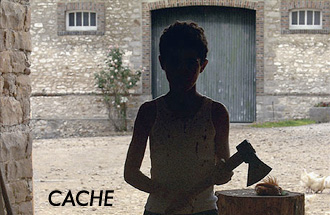 Q: So Lost Highway is a representation of this psychic wilderness, whereas Cache is more sociopolitical, more concrete.
Q: So Lost Highway is a representation of this psychic wilderness, whereas Cache is more sociopolitical, more concrete.
A: It’s about specific things that were done in what is essentially a class drama, a drama of privilege and subjection. On the other hand, I’m sure when David Lynch saw Cache, and saw that incredible scene where the guy cuts his own throat, I’m sure he thought, “Ah, god, why didn’t I think of that?” That is one of the most heartrending scenes I’ve ever seen in a movie. I wasn’t prepared for it, nobody in the theater was, we were all up on the ceiling and didn’t know how to get down.
Q: Regarding Europeans who have interesting, forceful reads on American identity, how do you feel about Lars Von Trier and his last couple of films, which have palpated the identity of an America he’s never visited?
A: I’ve only seen Dogville. I have to say, I really was sucked into it completely. It took awhile, and not every actor is as good as every other, and none are as good as Nicole Kidman. But it became more and more awful, the notion of a town feeding off the outsider in an almost literal way, couldn’t be doing it more if they were eating her body bite by bite. I didn’t take it––well, I was going to say I didn’t take it as a metaphor for America, but I did, that’s how it’s presented, what it’s supposed to be. I don’t care that he’s never been to America, everyone carries an America around inside themselves, their idea of what it is and what it should be. Why it’s a lie, why it’s alluring. I don’t consider that condescension on his part. What I hated about the movie was the whole montage of American misery, bums sleeping in the streets, David Bowie singing “Young Americans.” I thought that was so cheap, and stupid.
Q: Von Trier’s definitely been known to go for the low blow from time to time. The following film, Manderlay, transported the same stage set and the same characters (played by different actors) to a different town, and this time took on American slavery. It pursued an idea that seemed very similar to the one in your book––the promise in one hand, the betrayal in the other. What Von Trier seems to do in most of his films is to introduce a character that represents some total idealism into a complex system, and then for the rest of the film Von Trier relishes destroying this idealism, which always becomes its opposite.
A: I really think ultimately that he’s untrustworthy, full of shit, manipulative, and a sadist. I think Breaking the Waves is an appalling movie in every manner. Think about what happens in that movie. We get to see a woman killed so that a man can be redeemed. Now, if that’s deep thinking, I don’t want this guy messing with my country. So I resisted Dogville, I didn’t want to like it, I went there to hate it. But I didn’t.
 Q: Are you someone who’s concerned with the concept of authenticity in any sense of the word as it relates to culture? Do you find it a viable concept?
Q: Are you someone who’s concerned with the concept of authenticity in any sense of the word as it relates to culture? Do you find it a viable concept?
A: I think it’s worthless. It only leads to people lying to others and themselves. It has never been true or meaningful. There have always been polyglot influences, particularly in this country, and people have sought them out, have wanted something different, new, strange. Take Dock Boggs, this great banjo player and singer from the Virginia mountains. That’s where his family has lived as long as anybody can remember. He learned songs from his father and brother in law, never left his little mountain community. What could be more folk than that, more authentic, his being truly the voice of his particular part of the Virginia mountains? Because when you talk about somebody as authentic, what you’re trying to do is localize them, narrow them down, pigeonhole them, stuff them and put them on display. But Dock Boggs actually became a performer and came to life as an artist because he listened to records by black blues singers from the big cities, that’s the stuff that really turned him on. You come back to Dock Boggs and you say, “No, he’s a phony, he just learned that stuff off records, that’s not his indigenous culture!” There’s a book called Escaping the Delta by Elijah Wald that attempts to debunk Robert Johnson, essentially saying he learned everything off records. It’s not authentic, it’s not real, folk, front porch, traveling down the road. Well, I’m talking about Dock Boggs and Robert Johnson, two of the greatest artists this country has ever produced, who ought to be talked about in the same breath as Faulkner. But there are people who want to make Faulkner a regional novelist too, rather than to say, “This is a guy using one little community, just like Roth uses Jews in Newark, as a microcosm for the enactment of the entire American drama.” If you understand Dock Boggs as a working class white male from the first part of the twentieth century, living in an impoverished section of Virginia, you will lose ninety percent of his art, same with Robert Johnson.
Q: So as you’ve just asserted, the concept of authenticity in art is bunk right on the surface. What do you think explains the persistence of this drive in American culture, to codify the authentic and inauthentic?
A: Part of it has to do with the absolutely overwhelming presence of commercial culture, which arrived here earlier and has always dominated our lives more than anywhere else. Certainly, in the post-Civil War period, it has been relentless. There was a time when you could drive through the South and you couldn’t find a fucking rock that was bigger than two feet by two feet that didn’t have an ad painted on it. It is seeking another life out from under the avalanche of stuff that’s obviously contrived, made up, has nothing to do with anybody’s desires or needs. It’s the desire of some people, ultimately, to deny the power of art. You can deny the power of art if you can put it in a box and say, “This is what it is.” Trying to construct narratives of authenticity around objects you love or think are good or think would be good for other people is turning art into politics or sociology. I don’t know the whole answer to this, I just know that the notion of authenticity is intellectually, morally, and physically––I mean, look at Kurt Cobain––destructive.
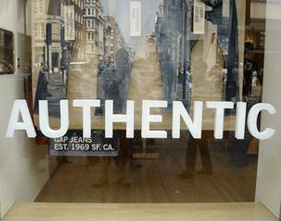 Q: So perhaps it’s a case of preference breeding ideology? We have things that we like for whatever reason and build a case for liking them around preferences.
Q: So perhaps it’s a case of preference breeding ideology? We have things that we like for whatever reason and build a case for liking them around preferences.
A: Sometimes, but sometimes I think we build cases around things we don’t like, but think we should.
Q: As someone whose been in criticism for a long time, and who’s arguably one of the architects of popular music criticism, I wonder if you’ve seen the field change a lot over your time in it, particularly regarding how entwined criticism is and has been with commerce.
A: It’s changed in that it’s always harder to find places that will let you write in public at length. It seems like space gets tighter and tighter all the time. In terms of it being intertwined with commerce, I don’t really know. The first place I ever wrote anything was at Rolling Stone in 1968, when Jann Wenner was the editor. We, the writers and section editors, had nothing to do with the record business. Jann did. Jann was going out and trying to get people to put ads in the magazine so it would survive, and wanted to meet people he’d always wanted to meet. But we were in San Francisco, there was no music business there, we didn’t go to press parties or junkets, we didn’t have people trying to inveigle us to like this or that in any serious way. The fact is that because I don’t live in New York City or Los Angeles, I’ve never had that. So I’m the wrong person to ask.
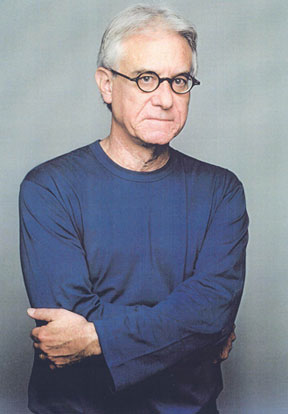 Q: From my vantage, it seems as if popular criticism is becoming more and more blatantly promotional. More and more young bands are recording one EP and then devoting the whole of their energies to promotion, hiring publicists and PR agencies. It seems like the whole tone of criticism has shifted since you got started, where writers are more expected to collaborate with the people who are selling the records.
Q: From my vantage, it seems as if popular criticism is becoming more and more blatantly promotional. More and more young bands are recording one EP and then devoting the whole of their energies to promotion, hiring publicists and PR agencies. It seems like the whole tone of criticism has shifted since you got started, where writers are more expected to collaborate with the people who are selling the records.
A: Then they’re not writing criticism. They’re writing promotion. Cameron Crowe started doing that at Rolling Stone a long time ago. He was, in essence, writing great press copy for various bands in the pages of Rolling Stone in the guise of actual journalism. It got to the point where bands Rolling Stone wanted to interview would only agree to be interviewed by Cameron Crowe––not that he wasn’t talented and hardworking––but they knew he would always make them come off well. They would always come off like really decent, interesting people. I think that was really destructive to the magazine. Cameron was never a critic, he was a reporter, a journalist. That’s not to say that what he was doing was less worthy, it was just different.
Q: As a cultural critic, you seem cut from a similar cloth to Joan Didion, another writer who came to prominence in the 60’s, who’s interested in popular culture, and who seems heavily influenced by having lived in California. For Didion, California was where the American frontier ran out and American history began to amass on itself, and on the West Coast, she could see the whole of it behind her. Has living in California had an effect you can pin down on your perception of American-ness?
A: Sure. I grew up in the 50’s in the Bay Area. I can’t imagine a better place to live, I still live there. It was a blessed place if you were white and middle class, it really was. The 50’s were not a great time for a lot of people––I was very lucky. The thing that I get out of California is people trying new things, and living in a more open and free way, and being out from under the oppression of class, racial, ethnic, religious identities, that certainly when I was growing up were still controlling almost all of the rest of the country, but not in the Bay Area. That taught me a lot about freedom, but it also taught me that California is real life. It’s not weird, it’s not strange, it’s not funny, it’s not odd. There’s nothing I hate more than East Coast reporters coming to California to write about some new trend that’s so weird. It gave me a sense of freedom and possibility as ordinary life, not as big, spectacular, “here comes the gold rush” stuff.